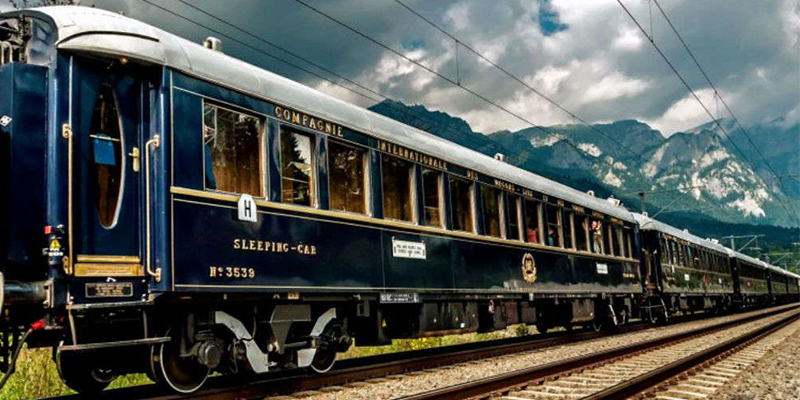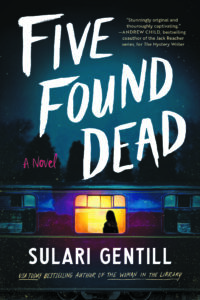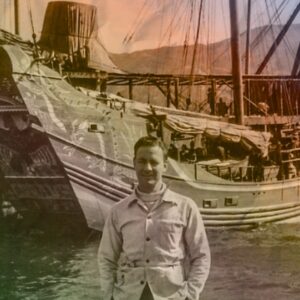You can still catch the Orient Express from Paris. There are several routes—the classic to Venice, and others to Brussels, Budapest, Geneva, Prague and Vienna. But whilst the train traverses Europe the most important part of the journey is in the traveler’s imagination.
A couple of years ago, my sister and I boarded the Orient Express in Paris. I had just finished a book tour in the US and so I was on a “mystery high” and well primed to follow in the footsteps of Poirot.
Whilst the train left from Gare de lEst the journey began years before when I first read Christie’s Murder on the Orient Express and The Blue Train, Ethel Lin White’s The Wheel Spins, Highsmith’s Strangers On A Train… but I guess that’s all back story, so I’ll jump to the action.
We arrived at Gare d l’Est in a limousine sent to collect us from our tiny hotel in the heart of Paris. It was 10pm. That time in itself seemed glamorous and mysterious. Parisians in long coats, and scarves, just visible under the cast of streetlights, the less warmly attired but equally stylish emerging from Moulin Rouge, heads bent together in some conspiracy or other, the occasional gendarme. There is a natural tension to the night, when the darkness makes every innocent enterprise seem covert.
We were dropped off at a platform dedicated to the Orient Express. The red carpet had literally been rolled out with a lectern at the end where tickets were checked and passengers welcomed and directed to the appropriate carriage. Porters took our larger suitcases and stewards in blue-and-gold uniform relieved us of our overnight bags. I was caught between wanting to experience every moment exactly as Agatha herself might have done, and wanting to record every moment via the anachronistically modern camera in my cell phone. In the end, I landed somewhere in the middle, capturing the details I was afraid I would forget and committing to memory the overwhelming sense of place and story that comes with a berth on the Orient Express.
We had, as instructed, come dressed for dinner. My sister and I had both elected to wear elegant black in timeless styles that were complementary to all the eras of Poirot. Many of the other passengers had gone further, arriving in the flamboyant feathers, beads and suspenders of flappers or the more sober but equally chic attire of the 30s and 40s. And so, I knew that we were boarding with fellow travelers, to whom the journey was as much a literary expedition as a physical one.
We were shown to our cabins where we had a moment to settle in and drink champagne before dinner. Whilst we still had not left the platform, the transportation had begun. I knew this cabin. I’d seen it in various film versions of Murder on the Orient Express and in my imagination as I’d read. Of course, over the years, the former had influenced my memory of the latter, and the cabin was an experience of gasping recognition and delighted discovery. The window looked out onto a now deserted platform, as the red carpet was rolled up by a solitary steward. I’m not sure if the platform lights had actually been dimmed but the shadows seemed deeper now, and foreboding, and there was a taut quiet which settled over us.
I heard footsteps in the corridor. I thought, Poirot perhaps. They stopped abruptly and were followed immediately by an urgent knocking on our cabin door. My sister and I exchanged a glance, and then I answered with us both ready to grab a candlestick if required.
It was not. A smiling steward asked if we were ready for dinner and directed us to the dining car.
Finding our table was like walking into a scene. The exquisite fittings and décor, starched linen tablecloths, white coated waiters, the gleam of the silver service. A prevailing sense of déjà vu and wonder. And again, I was looking for Poirot.
We took our seats at a table set for four and as we waited for whoever else would be allocated to our table, I began to think about how much this experience was enhanced by, not only the history, but the story, of this train.
Agatha Christie travelled on the Orient Express, but, as much as this was the same route, and the historic details of the carriages had been preserved or meticulously recreated, we were not really travelling on the same train. What Agatha wrote changed forever, how I, my sister, and our fellow passengers would experience the Orient Express. For us, the journey would be colored by what she and other storytellers made up. To be honest, I don’t think it would be possible for me to board the Orient Express without bringing Poirot, Miss Froy, Haines and Bruno, and Miss Marple with me. Indeed, so powerful is the spell these stories cast, that their characters often turn up on even ordinary trains between Sydney and Melbourne. Here, the magic is amplified.
We are joined at our table by the Fergusons, a couple from Ireland who are as excited as we are, and for whom this journey has the same pseudo-historical moment. We spend five delectable courses casting our fellow diners and the staff as villains and victims and by the end of the meal we are no longer strangers on a train (sorry – couldn’t help myself).
From the dining car we move to the Midnight Bar in one of the adjoining carriages. There is a grand piano on one end from which the pianist fills the carriage with live jazz. The seats and lounges allow for intimate conversations around a narrow corridor in which careful dancing is possible. And so, we mingle. The words, “I can’t believe we’re here,” become a kind of opening introduction.
Of course, by here, we’re all talking as much about the place in literature as the actual train. And I ponder again on locations which exist simultaneously in the world and in imagination. How what something someone made up can be as imbued into a place as it’s physicality and actual history. And it was at that point, as I sat with a cocktail listening to the music and the conversation around me, that I began to wonder how a story in a place which was already a product story would occur. How would what happened in someone else’s imagination influence the actions and perceptions of characters in my imagination? Would a story that was layered on top of another be richer for that? Could one even talk about this experience without mentioning the literary ghosts which walked this train? And finally, was there room for another murder on the Orient Express?
We called it a night at about three in the morning. The cabin had been transformed into a sleeper while we were at dinner and the delight of it reinvigorated us for a while. I donned the complimentary robe and slippers and made my way to the restroom at the end of the carriage, not out of any requirement but because I remembered David Suchet doing so and overhearing vital information in the process. We drifted off eventually and awoke a couple of hours later to make our way back to the dining car for breakfast. I must admit that prior to coffee, I was feeling much more like Miss Marple than her younger counterparts. Fortunately, the Orient Express is expert at caffeinating the weary traveler in preparation for another day in luxury.
With the revels and excitement of the first night behind us, the hours to Venice became more sedate, more like train travel than a party. We mingled with other passengers over a constant stream of refreshments of one sort or another, and we explored the train. We sat in plush lounges and admired the view as we wound our way past the Italian Alps. We thought about avalanches. Time seemed to slow, but not because I was bored in any way, but because this journey did not seem connected to the real world, it did not seem to follow the same rules of space and time. The train was confined and finite, but it opened into the infinite expanse of the imagination, time passed but each moment was stark and layered and connected to other moments in story, within that passing. I was on the Orient Express for less than a day but there were years of experience in that time.
Inevitably though, we reached Santa Lucia in Venice and disembarked. As I stepped off the train onto the platform, I could hear Poirot whisper, “Stay, mon ami. There is much to be discovered yet.”
And I promised him I would return one day, if only in my own writing.
_________________________________


















